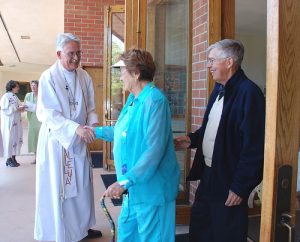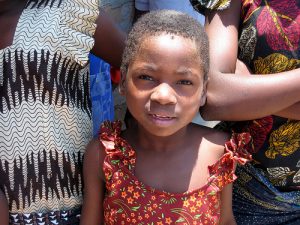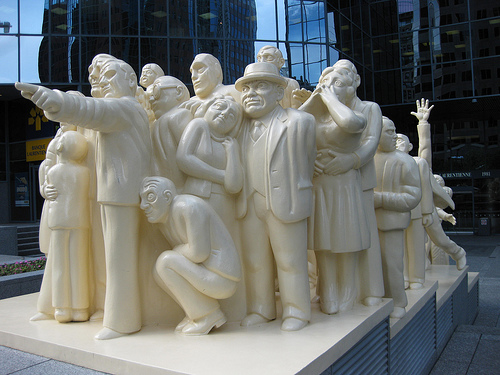Lectionary Reflection
Fifth Sunday of Easter, May 22, 2011
Once you were not a people, but now you are God’s people; once you had not received mercy, but now you have received mercy. 1 Peter 2:10
Do you remember what life was like before you became a Christian? For most Lutherans, this question may seem like a weird one. In our tradition, infants are baptized and incorporated into the faith community, and decision theology is not a part of the equation. You’ll often hear someone describe him or herself as a “cradle Lutheran,” or Lutheran from birth.
I did not grow up Lutheran, so I do remember distinctly my “entry point” into the Christian faith as a nervous sixth grader looking out from a baptistery and wondering if I really knew what this was all about. Looking back I honestly can’t say that I understood a whole lot more than an infant brought by her parents to the waters of baptism. One minute I wasn’t something, and the next minute I was–a baptized Christian and a dripping wet disciple. It was all about God and not about me, that’s for sure.
 Even if one is not an active and regular churchgoer, the idea of not being affiliated with a particular faith tradition can feel foreign. I’m Lutheran, or Methodist, or Anglican, or Catholic, or Baptist, or Presbyterian, or however you fill in the blank–this is a way we identify ourselves and find affiliation and belonging to the One who is oh-so-much-bigger than us. If asked, we may say “I go to Trinity Lutheran,” or “I attend Westminster Presbyterian,” or “My people have always gone to St. Stephen’s.” We are God’s people of various brands and varieties.
Even if one is not an active and regular churchgoer, the idea of not being affiliated with a particular faith tradition can feel foreign. I’m Lutheran, or Methodist, or Anglican, or Catholic, or Baptist, or Presbyterian, or however you fill in the blank–this is a way we identify ourselves and find affiliation and belonging to the One who is oh-so-much-bigger than us. If asked, we may say “I go to Trinity Lutheran,” or “I attend Westminster Presbyterian,” or “My people have always gone to St. Stephen’s.” We are God’s people of various brands and varieties.
Whoa! Back up a minute. Just what does it really mean to be God’s people? How do we explain ourselves in today’s world to people who see what we do as weird, antiquated, or inaccessible? These are questions we need to ask one another frequently and ponder well. Yes, we have received mercy, and yes, we belong to God, but now what?
When this letter was written to leaders of far-flung Christian communities in Asia Minor, it was tough to be a Christian. It was risky, involved bucking the prevailing culture, and required sacrifice and commitment. Being a Christian is still a countercultural proposition, but thanks to freedom of religion and life in a democracy, we Christians face more risk walking across a busy intersection than we do warming a church pew. More commitment is required of Rotarians and country club members in most cases. Sadly there is often more urgency to get home for Sunday afternoon football than there is to share the good news and engage in ministry.
 I know. That is not the case in every community, but sadly it is the case in too many communities. The question for leaders and teachers today is this one: How do we communicate the amazing gift we have now–that we are God’s people, wrapped in mercy, grace, and love? How do we help our communities to see just how special we are because of God’s naming and claiming us? I believe if we can communicate this message effectively in a way that resonates with the wounded yet beautiful lives of the people we serve, then that tiny spark of recognition and joy will ignite a true passion for evangelism–for sharing what has been given to us through no merit of our own with every person possible. This is the “now” in which we live.
I know. That is not the case in every community, but sadly it is the case in too many communities. The question for leaders and teachers today is this one: How do we communicate the amazing gift we have now–that we are God’s people, wrapped in mercy, grace, and love? How do we help our communities to see just how special we are because of God’s naming and claiming us? I believe if we can communicate this message effectively in a way that resonates with the wounded yet beautiful lives of the people we serve, then that tiny spark of recognition and joy will ignite a true passion for evangelism–for sharing what has been given to us through no merit of our own with every person possible. This is the “now” in which we live.
I’ve said it before; we’re not dealing with rocket science or quantum physics here, folks. We’re dealing with something both much simpler and infinitely more complex. We are dealing with the Divine, with the Creator of all that was, is, and is to come. I don’t know about you, but I find that to be more exciting than anything Disney can offer, more comforting than homemade mac and cheese, and more challenging than a climb up Mt. Everest. What a wonder! What a WAY!
Whether you focus on this text or on the gospel (John 14:1-14), please give careful thought to how you will point to Christ as the model and the way to this present and abundant life. What we do is by the grace of God; the live into which we have been invited and into which we invite others is nothing short of amazing. Peace to you and blessings on your preaching and teaching.
Visual
With Youth
Talk about what it means to be a living stone. Use the example of a cheer pyramid. Each person must carefully support his or her part of the formation. If one person falters, the entire group is at risk. As living stones we have an unfaltering cornerstone in Jesus; our challenge is model ourselves after the cornerstone so that we build the strongest faith community possible. Ask youth how a strong faith community might benefit them in their daily discipleship walk. Ask what’s missing and where the support system is lacking. Listen closely to their answers. You may just find some instructive information for strengthening your program.
With Children
Consider talking with children about how we grow as Christians. We start simple being fed milk–just like a newborn infant and we progress to a variety of wonderful foods. You might invite a mother with her baby to join you so the children can see the infant being fed milk or formula from a bottle. Contrast that with a basket of colorful fruits, vegetables, bread, juice, and other good things to eat. Explain to children that just as infants cannot eat a whole piece of fruit, we grow into our faith. You could also use a progression of jeans or shirts ranging from infant to adult sizing.
Photo by Goodnight London, htlcto, and christopher vanbelle used under Creative Commons License. Thanks!




Leave a Reply